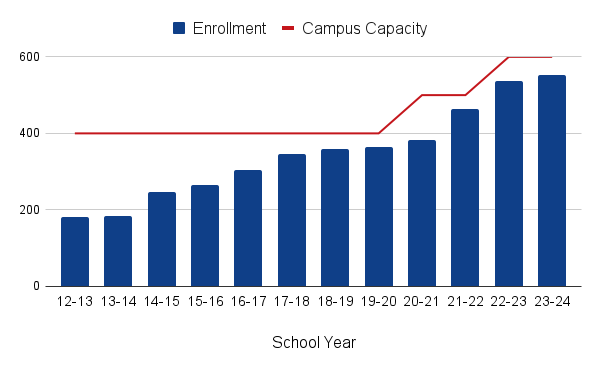|
Recently I joined our High School Biology classes for a Q&A session. They were preparing for their annual "Creation-Evolution Debate.” This activity requires students to dig deeper into the Scriptural principles behind the origin of life and all creation. Students also apply scientific principles to develop a framework of understanding. It was exciting to participate with them in the process. After years of discipleship training, they were ready to dig into one of the deepest issues of faith.
The Christian worldview of our students is informed by Biblical truths and has practical implications of how they view the world around them. Too often, the vague and broadened category of pseudoscience makes claims in opposition to a Christian worldview. This often can be confusing for Christians, feeling like they must choose between faith and science. But there is no conflict between faith and science. The God of our faith is also the God of science. By definition, science is built through direct observation, experimentation, and evidence. Practicing true science is one of the most enjoyable and accurate pursuits of learning. Atheists who do not believe in God develop their own religions to support their worldview. They use pseudoscience, built upon unprovable secular assumptions, to support their views that God does not exist. At Crosshill, our students seem to be wise to this ploy, eager to honestly investigate creation using true science. As I chatted with our students, we discussed how God created a mature earth. One that was already “grown-up” and ready for His children. We discussed what the scientific community currently knows about life through true science, and how those facts beautifully intersect with God’s Word. We discussed how the theory of evolution exists out of man’s need for hope, and to answer the 4 Big Questions of Life. “Where did we come from and how did we get here?” “What is the meaning of life?” “How do we determine right and wrong?” “What happens to us when we die?” Man’s need for hope cannot be found in unsubstantiated Godless theories that leave man at the center of the Universe. But when God’s position as the Creator and Sovereign Lord of all creation is confessed, hope reigns supreme. As we enter the summer season, engage intentionally with the creation around us. Share with your children how the God of the universe is the Great Scientist who made all of this just for us Leaders on our campus are constantly asking this question: "What does God expect of us?" It's a way of holding ourselves accountable for pursuing God's purposes. It is so easy for our own personal preferences and ambitions to cloud the mission and vision God desires for His school. Following the wrong path is both futile and wasteful. So what is God's path for Crosshill? What does He expect of us? We firmly believe that Crosshill exists as a direct response to God's directive. We believe His particular mission for Crosshill is to train disciples. We believe His vision for Crosshill is to graduate students who have a clear assurance of their salvation, who are surrendered to Christ's Lordship, and who desire to serve in His Kingdom in various ways. We believe that Crosshill is His school and our team are simply stewards of it. One area of stewardship is cultivating a community intended to experience this mission and vision. We are constantly considering how to develop a school that is prepared to receive the families God wants to bring to us. It often requires an identity of shepherds who are constantly providing love, safety, and nourishment for growth to their flock. In addition, God is in charge of what sheep go in and out of the gates. The chart below gives a numerical snapshot of the journey God has taken us on over the past decade. In response to God's leading, we have gradually been increasing our campus capacity. These steps have been in preparation for the families God has designed to join our community. Currently, our campus is designed for a student capacity of around 600 students. We believe this capacity is what God expects of us for the foreseeable future. Enrollment of new families is always a prayerful and strategic partnership. We are constantly asking, "What does God expect of us?" when making these decisions. God has entrusted us with a specific community in His Kingdom. What a responsibility! This same principle holds true in our families. Our children are on loan from God. Our parenting decisions should be prayerful and strategic as we continue to pursue his purposes in our lives and the lives of our children.
Over the summer, we will be moving some of our modular classroom buildings as part of our master plan to improve campus access and space availability. Additional bathrooms will also be installed. As we look to the future, we desire to add another gym as well as additional spaces for different career and trade instruction. Once again, thank you for your partnership with Crosshill. For some, this journey has spanned decades! For others, this fall will be their first season in our community. Regardless, it's always exciting seeking to understand and fulfill what God expects of us! Do you remember when you were a kid and your bicycle handlebars got messed up? Your front tire would be pointing one way, while your handlebars pointed in a different direction. Fortunately, a well-placed crescent wrench and a steady hand could tighten things back into alignment.
A lack of self-control is similar to having bent handlebars. Everything is out of alignment. No matter how hard you try, the direction you are taking will always get you into trouble. A person without self-control is out of control and cannot come under God’s control. Fortunately, the handlebars of our lives are never permanently bent out of shape. The well-placed redemptive power of God and His steady hand can always bring us back into alignment. The power of His Holy Spirit can prevent loose or bent handlebars through the practical fruit of self-control. I remember when one of my parent's 4-wheelers got bent out of shape on their ranch in a minor accident. The handlebars and front tires were permanently out of alignment. In order to drive straight, you had to turn the handlebars right. In order to drive left, you had to turn the handlebars straight. What a mess! It was not a surprise when that particular 4-wheeler only got into more accidents! A lack of self-control generally results in compounding more permanent problems. While listed last, self-control is the key to releasing all of the other 8 fruits of the Spirit. When self-control is not carefully developed and practiced, more unpleasant controls and consequences often result. Thanks be to God that the consequences of sin are not permanent with God! He is a miraculous mechanic always available and able to repair any mess we find ourselves in. This summer, as we put down the remote control, may we focus on developing self-control with our children. God is eager to release new challenges and new fruit in the lives of His disciples. We must first give God permission to govern our lives through the power of His Spirit. A surrendered life, fully under God’s control, provides the most eternal and fulfilling freedom possible |
Adam Kronberger
|
SUPPORT |
NETWORK |
QUICK LINKS |
|



 RSS Feed
RSS Feed

